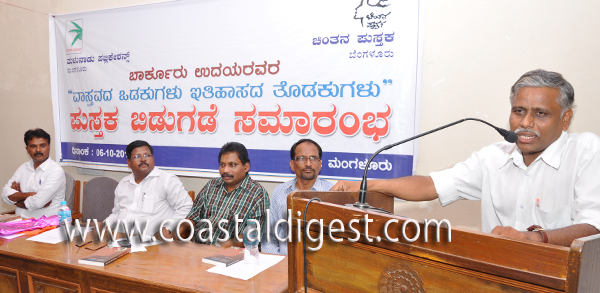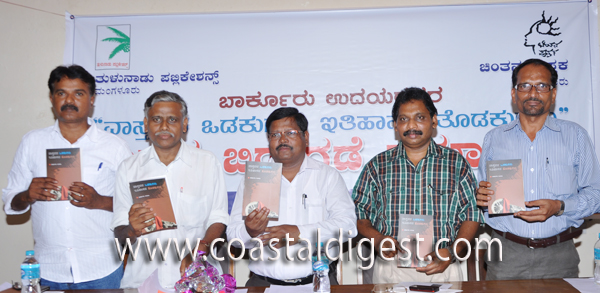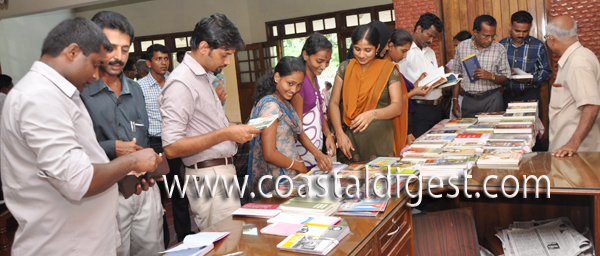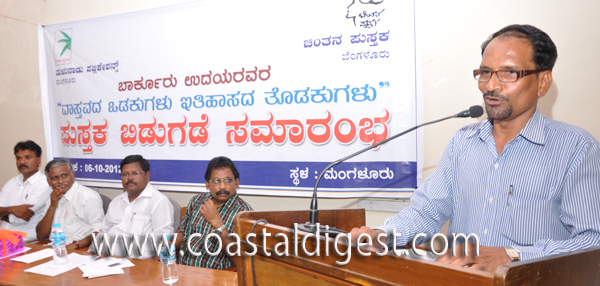
He was speaking after releasing a book 'Vaastavada Vodakugalu - Itihaasada Todakugalu' authored by Dr. Barkoor Udaya, History Professor, Mangalore University, on Saturday in Mangalore. The programme was organised jointly by Tulunadu Publications and Chintana Pustaka, Bangalore.
The British always followed the policy of divide and rule and showing Muslims in negative light in history was also a ploy employed by them to create a divide between Hindus and Muslims, Mr. Shivasundar said.
“The history of Muslims documented by the British prior to 1857 and that after 1857 shows marked differences. The British were particularly insecure of the unity among people after the 1857 uprising and hence used this tactic of projecting the Hindu history as the better one to create a divide. 'Vande Mataram' was written with this same sense of anti-Muslim and pro-British sentiment. The summary of 'Vande Mataram' is that Indians must join hands with the British against the Muslims and get back the old lost Hindu glory”, Mr. Shivasundar said.
Stating that references to Muslims as 'invaders' and the 'enemy' are finding mentions in history text books nowadays, Mr. Shivasundar said that an attempt to look at Muslims as foreigners and not belonging to this land is being made vehemently. “It is wrongly being projected that Islam entered India on the might of the sword. Muslims are referred to as plunderers of temples but even Hindu kings had plundered temples. In Harshavardhana's time, there was a separate minister in his court meant for temple plundering as they were sources of wealth those days. According to a British historian, Islam came to India way back in 711 AD in its 'Sufi' form, spreading the message of peace and love. It was natural for locals to accept Islam for its message of equality, who were otherwise subjected to a suppressive 'Varnashrama dharma' (caste system)”, he said.
Shedding light on the farmers' struggle against British, Mr. Shivasundar said that many in the army of Tipu Sultan were “farmers in uniform”. “The British would normally merge armies that they defeat to their own but they disbanded Tipu's army because in his army, there were many farmers in uniform who had deep-rooted hatred against the British. Sangolli Rayanna's struggle too was both an anti-British as well as anti-landlord”, he said.
An attempt to 'recapture' Ambedkar is taking place today to woo Dalits, Mr.Shivasundar said, adding that in spite of there being a difference of chalk and cheese between Gandhi and Ambedkar, attempts are being made to project the two as one, who fought for the same cause.
Urging the student community to question history inputs they get in schools and colleges, Mr. Shivasundar lamented that lack of curiosity among students is resulting in accepting the details in the text books and those taught by teachers as the divine word.
C J Laxmipathy, Lecturer of Sociology from Bangalore, shared his observations on the contents of Mr. Udaya's book. Prof. K Abhaya Kumar, Head of Kannada Department, Mangalore University, presided. Umar U H, Director, Tulunadu Publications, Mangalore, welcomed. Vasanth Raj of Chintana Pustaka, Bangalore, proposed the vote of thanks.











Comments
Add new comment